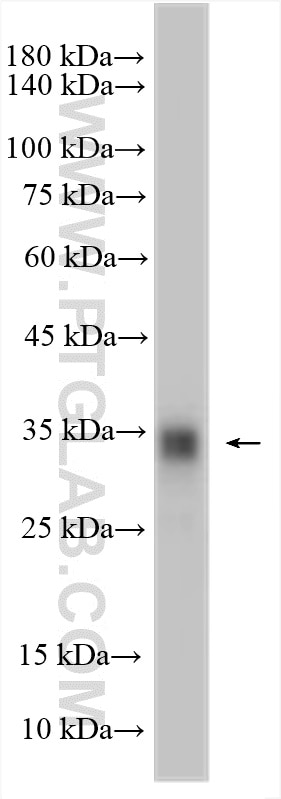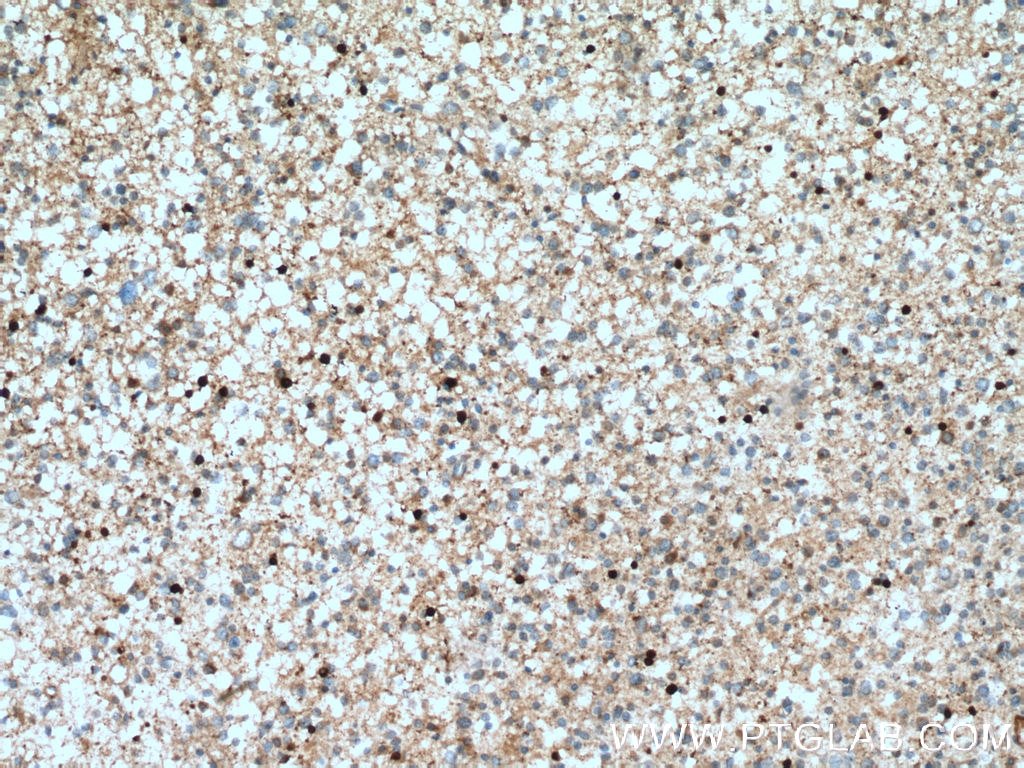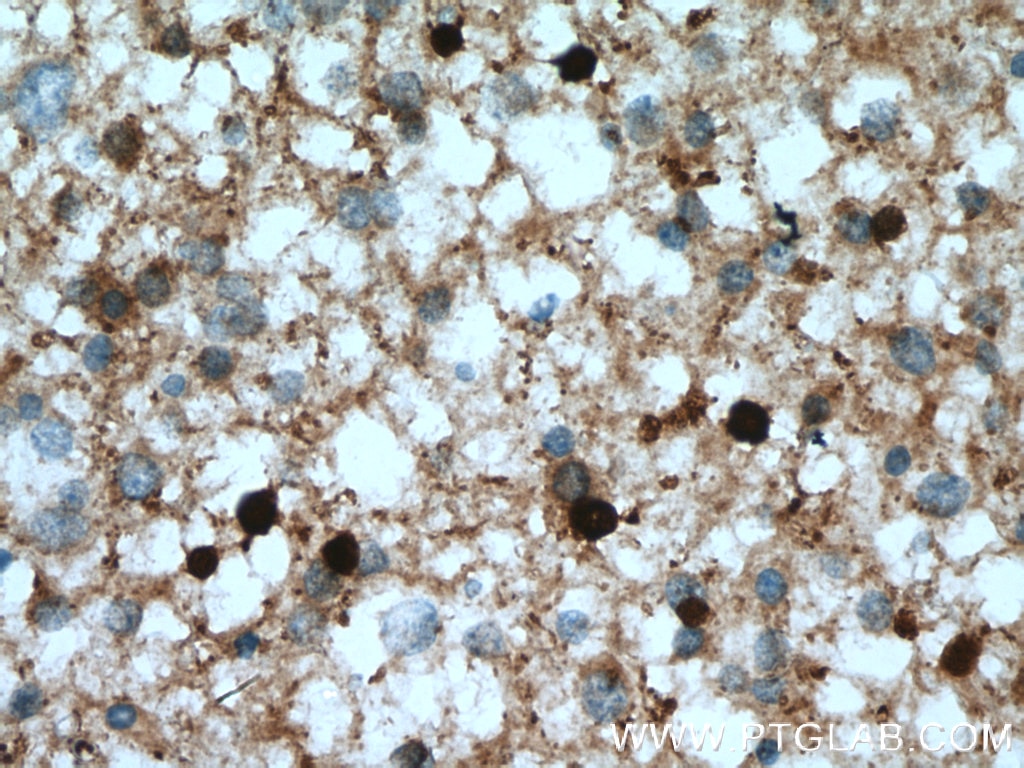- Featured Product
- KD/KO Validated
ASPA Polyklonaler Antikörper
ASPA Polyklonal Antikörper für WB, IHC, ELISA
Wirt / Isotyp
Kaninchen / IgG
Getestete Reaktivität
human, Maus, Ratte
Anwendung
WB, IHC, IF, ELISA
Konjugation
Unkonjugiert
Kat-Nr. : 13244-1-AP
Synonyme
Geprüfte Anwendungen
| Erfolgreiche Detektion in WB | Maushirngewebe |
| Erfolgreiche Detektion in IHC | humanes Gliomgewebe Hinweis: Antigendemaskierung mit TE-Puffer pH 9,0 empfohlen. (*) Wahlweise kann die Antigendemaskierung auch mit Citratpuffer pH 6,0 erfolgen. |
Empfohlene Verdünnung
| Anwendung | Verdünnung |
|---|---|
| Western Blot (WB) | WB : 1:1000-1:6000 |
| Immunhistochemie (IHC) | IHC : 1:50-1:500 |
| It is recommended that this reagent should be titrated in each testing system to obtain optimal results. | |
| Sample-dependent, check data in validation data gallery | |
Veröffentlichte Anwendungen
| KD/KO | See 1 publications below |
| WB | See 6 publications below |
| IHC | See 1 publications below |
| IF | See 3 publications below |
Produktinformation
13244-1-AP bindet in WB, IHC, IF, ELISA ASPA und zeigt Reaktivität mit human, Maus, Ratten
| Getestete Reaktivität | human, Maus, Ratte |
| In Publikationen genannte Reaktivität | human, Maus, Ratte |
| Wirt / Isotyp | Kaninchen / IgG |
| Klonalität | Polyklonal |
| Typ | Antikörper |
| Immunogen | ASPA fusion protein Ag4029 |
| Vollständiger Name | aspartoacylase (Canavan disease) |
| Berechnetes Molekulargewicht | 313 aa, 36 kDa |
| Beobachtetes Molekulargewicht | 36 kDa |
| GenBank-Zugangsnummer | BC029128 |
| Gene symbol | ASPA |
| Gene ID (NCBI) | 443 |
| Konjugation | Unkonjugiert |
| Form | Liquid |
| Reinigungsmethode | Antigen-Affinitätsreinigung |
| Lagerungspuffer | PBS with 0.02% sodium azide and 50% glycerol |
| Lagerungsbedingungen | Bei -20°C lagern. Nach dem Versand ein Jahr lang stabil Aliquotieren ist bei -20oC Lagerung nicht notwendig. 20ul Größen enthalten 0,1% BSA. |
Hintergrundinformationen
ASPA(Aspartoacylase) also called aminoacylase-2, is an enzyme that hydrolyzes N-acetyl-L-aspartic acid (NAA) to aspartate and acetate.Human ASPA encodes a deduced 313-amino acid protein with a molecular mass of 36 KDa. It shares 92% sequence identity with the bovine protein and contains 1 potential N-glycosylation site and 5 phosphorylation sites.Defects in ASPA are the cause of Canavan disease (CAND).This protein can exsit as a homodimer(18293939).
Protokolle
| PRODUKTSPEZIFISCHE PROTOKOLLE | |
|---|---|
| WB protocol for ASPA antibody 13244-1-AP | Protokoll herunterladen |
| IHC protocol for ASPA antibody 13244-1-AP | Protokoll herunterladenl |
| STANDARD-PROTOKOLLE | |
|---|---|
| Klicken Sie hier, um unsere Standardprotokolle anzuzeigen |
Publikationen
| Species | Application | Title |
|---|---|---|
Mil Med Res Aspartoacylase suppresses prostate cancer progression by blocking LYN activation | ||
Elife Conservation and divergence of myelin proteome and oligodendrocyte transcriptome profiles between humans and mice. | ||
Glia Developmental maturation and regional heterogeneity but no sexual dimorphism of the murine CNS myelin proteome | ||
J Neurosci Suppressing N-Acetyl-l-Aspartate Synthesis Prevents Loss of Neurons in a Murine Model of Canavan Leukodystrophy.
| ||
Front Pharmacol Increasing Aspartoacylase in the Central Amygdala: The Common Mechanism of Gastroprotective Effects of Monoamine-Based Antidepressants Against Stress. | ||
J Med Virol HPV-CCDC106 integration promotes cervical cancer progression by facilitating the high expression of CCDC106 after HPV E6 splicing. |




